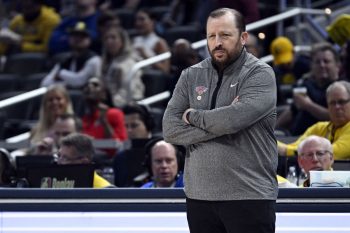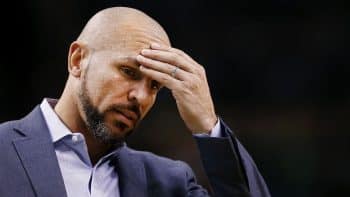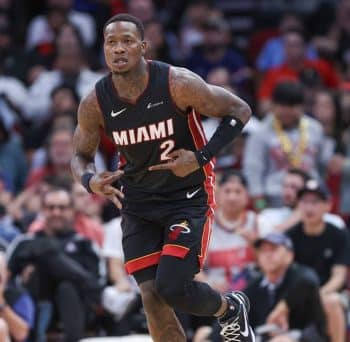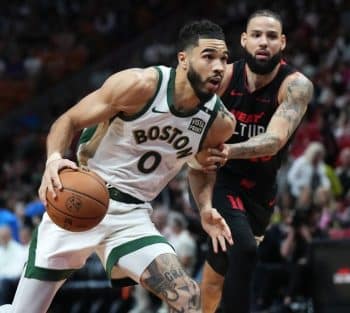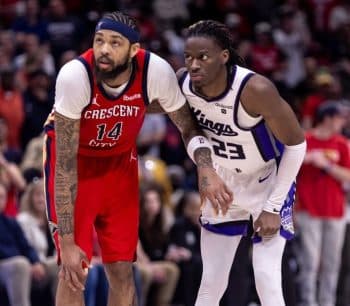NBA
NBA PM: The Journey of an Undrafted Rookie

Every kid who has picked up a basketball and taken the sport even semi-seriously has imagined being drafted. “With the first pick in the 2014 NBA Draft, the [insert your favorite team] select [insert your name] from [insert your favorite college].” The fans in attendance are ecstatic. Your friends and family scream and celebrate. This one sentence from the NBA Commissioner’s mouth changes your life forever.
It’s all symbolic, of course, but it means you finally made it. It means all of your hard work paid off. It means you have joined an exclusive fraternity that millions can only dream about entering. It’s a moment often described as unforgettable – on par with getting married or holding your newborn child for the first time. It’s winning the lottery and realizing a lifelong dream all at once. It’s a fact that follows you for the rest of your life, whether it’s sitting proudly atop your biography or constantly coming up in conversations.
But for every prospect who gets to hear his name called on draft night, there are hundreds of players who never get to experience that moment. Each year, only 60 prospects can be drafted, but hundreds enter the draft pool. Many leave school early to chase their pro dream, and every college senior who is no longer NCAA eligible is in the pool as well. Following every draft, there is a lengthy list of undrafted players who will never know the feeling described above. Some stop playing basketball and transition to a more traditional career. Some sign overseas or enter the NBA Development League so that they can make some kind of living playing the sport they love.
Then, there are some who refuse to give up on their NBA dream, determined to show the executives around the league that they made a colossal mistake by passing on them. The journey from undrafted free agent to significant NBA contributor is a difficult one, but it’s certainly possible to carve out a role in the league without being picked. Players such as Ben Wallace, Darrell Armstrong, John Starks, Bruce Bowen, Brad Miller, Raja Bell, Wes Matthews, Udonis Haslem, Chuck Hayes, Jeremy Lin and Reggie Evans among others are proof that going undrafted can be the beginning of one’s NBA journey rather than the disappointing end.
Eric Moreland, a 6’10 forward out of Oregon State, hopes to join that list of NBA difference makers who were once on the outside looking in on their draft class. He went undrafted this year, but hopes that years from now people will look back on that information in shock. “He didn’t even get picked? What were those executives thinking?”
As he sat and watched the conclusion of the 2014 NBA Draft broadcast, he felt many emotions. He was angry, disappointed and surprised. But more than anything, he was motivated.
“I love proving people wrong,” Moreland told Basketball Insiders. “I do this for two reasons: I do this for my Mom and I do this to prove people wrong. I never wanted to go the NBA for the money. It was never about that; I just wanted to prove people wrong. Going undrafted was just another obstacle for me. It’s always been like that. It started with high school, where no one was talking about me. It continued when I first got to Oregon State, when no one was talking about me. It’s always been the same path. I have a chip on my shoulder. People have always doubted me. All of that stuff right there, that’s just all the extra motivation. I don’t go out there thinking about it when I’m playing, but I do love proving people wrong. I’d be lying if I said I didn’t love it. It’s a great feeling.”
***
After months of going through exhausting pre-draft training and flying all over the country to work out for teams, Moreland really thought he was going to be picked. He completely bought in to the process, waking up early every morning to head to the gym on the campus of IMG Academy in Bradenton, FL. He would work out all morning, doing some drills on the basketball court and others on IMG’s football field, lift weights and simulate the things he’d be doing in team workouts. He would scrimmage against the other draft prospects who were going through the same pre-draft training, including Duke’s Rodney Hood, Tennessee’s Jarnell Stokes, Florida’s Patric Young and New Mexico’s Alex Kirk. These other prospects recorded better statistics in college and had higher profiles, but Moreland always kept up in the drills and games. His athleticism, instincts and 7’4 wingspan made him a difficult match-up for even the most talented players. After going through his rigorous workout each morning, Moreland would take a short break, eat a customized meal designed to help him add weight and maximize his workout, and then return for an equally taxing afternoon session.
Moreland approached the workouts with an excellent attitude and always seemed to have a smile on his face. He would joke with the IMG students, who would sometimes gather in the gym to watch the NBA hopefuls train. He was thrilled to be focusing 100 percent of his time and energy on basketball, and it seemed he realized just how lucky he was to be in his position. He was working incredibly hard and having a blast at the same time, smiling through every session, excitedly trying on free pairs of shoes provided by his agency and giddily discussing the previous night’s NBA games like a fan during breaks in the workout (with Chicago’s Taj Gibson being his favorite player to watch and study). Basketball wasn’t just a priority for Moreland, it was his entire life.
“He could hold his own against everybody, and he was just so aggressive,” IMG’s NBA trainer Dan Barto said. “Like, if we had been handing out jobs at IMG, he approached it like he was trying to take the job from the other prospects. He was focusing and training hard, and then calling interns to get treatment and extra work in afterward. He made that transition to being a pro. He was ready to take someone’s job and succeed at the next level.”
When Moreland wasn’t working out with Barto, he was traveling around the country to display his skill set for NBA teams. He didn’t get invited to the NBA Draft Combine, but participated in a large group workout in Brooklyn that was attended by executives from every NBA team. He also went through individual workouts with more than half of the teams in the league. He would fly to an NBA city, work out, return to IMG and then repeat – sometimes the very next day. He was constantly rushing through airports and living out of a suitcase. The only way he could recall every stop of his pre-draft tour was by looking through his wardrobe, which had been taken over by official team-issued apparel (which was another perk that excited him).
After months of this non-stop grind, Moreland settled in with family and friends in Houston to watch the draft on June 26, 2014. He knew it was unlikely that he’d be a first-round pick, even though he had worked out well for a number of teams in that range. In college, he had been suspended and had some off-court issues, which he acknowledged hurt his stock. When his name wasn’t called in the first 30 picks, he figured it wouldn’t be so bad to be a second-rounder.
Then, name after name was announced, but he remained on the board of available players. He watched as teams he worked out for decided to pick other players, some of whom were at the same workout he attended. A number of teams called to ask if he’d be interested in a “draft-and-stash” situation, which is when a player will be picked and have their rights owned by that team, but then spend time overseas. This wasn’t something that interested Moreland, who didn’t want to be out of sight and out of mind.
The final pick of the evening, belonging to the Brooklyn Nets, was read. Cory Jefferson, whom Moreland had faced in some workouts, was the last selection. After putting in the work and fully dedicating himself to the pre-draft process, Moreland had officially gone undrafted.
***
“The most disappointing part is just not hearing your name called,” Moreland said. “That’s the dream come true, hearing that. That’s just the cool part about it, the fancy, good look part of it. I wasn’t too down on myself or whatever though. I worked hard and it just turned out how it turned out. I felt like it went according to plan actually.”
Even though he wasn’t picked, he continued to work hard and remained at IMG throughout the summer. Barto believes that going undrafted flipped a switch in Moreland, which helped him in the long haul.
“When Eric went undrafted, I think that was the moment that he accepted he had to be a pro 24/7,” Barto said. “He kept working hard. He was in the gym all summer, and got to learn from veterans like Amar’e Stoudemire and Iman Shumpert when they came to IMG for their offseason workouts. What happens after the draft is important. Everyone is working hard during the pre-draft process, but then what do they do after that? Some guys get drafted and stop working out, stop being a pro. They go back to being a college kid – or they go back to living with Mom and Dad and being a spoiled high school kid. The undrafted guys keep grinding because they still have something to prove.”
After getting over the initial disappointment of not being picked, Moreland realized that not being selected could actually be a blessing in disguise. Suddenly, he was a free agent and had control over where he would be playing. He could look at every team and see where he’d have the opportunity to earn minutes and where his style of play was needed. Immediately after the draft, teams started calling his agent to see if Moreland would join their Summer League squad. Meanwhile, he was weighing the pros and cons of each situation and looking at each franchise’s depth chart.
“I just thought it could be a good opportunity to be a free agent, so that you have more options,” Moreland said. “You can find out where the best fit is for you. Some teams had called earlier in the night and said, ‘Would you be willing to be drafted and be stashed [overseas]?’ Me and my agent passed on that. So it wasn’t necessarily that I didn’t get drafted, it’s that I didn’t really want to be drafted and then stashed overseas or in the D-League for a whole year without a chance. We passed up on those options and figured, ‘Let’s hit the free market.’ The worst-case scenario was playing in the D-League and hopefully I’d get a call up sooner than later. I wasn’t really disappointed [after I started realizing my options].”
One of the first calls that Moreland received was from the Sacramento Kings. He wasn’t too surprised, since he had a very strong workout for them in early June and believed they needed someone with his skill set. His time in Sacramento was one of the individual workouts that stood out most for him, since it also included lottery prospects like Marcus Smart, Elfrid Payton and Noah Vonleh. Even though he was matched up against top-10 picks, he says he shined.
“I had a lot of workouts and I was trying to move them around so I could fit every team in as much as I could possible, and I was about to move my Kings workout but one of the guys in the front office told me, ‘You should probably come to this workout because we got a bunch of lottery guys coming in and we want to see how you do against them,’” Moreland recalled. “So I went and I did really well against those three lottery guys that were there. I excelled. Then, they called me back for a second workout, but I didn’t go back [due to my busy schedule]. Right after the draft they called, and I knew they were high on me. They had told me after my workout, ‘We don’t have a second-round pick, but we’ll be watching you.’ So I ended up going with them because I felt like they were the highest on me, and I thought they’d give me a good opportunity.”
After agreeing to play in the Las Vegas Summer League with the Kings, Moreland had a team to call his own. But this was just the first step, as he would soon learn.
***
“The common denominator for all undrafted players who achieve success is mental toughness,” said NBA agent Roger Montgomery, who has represented undrafted free agents such as Jeremy Lin, Maurice Evans and Stephen Graham (all of whom played in the NBA). “They need to be a dog. They need to be mentally tough and not be persuaded by what anybody thinks or says [about them]. Jeremy had that, Mo had that, Stephen had that, and I helped all three make it to the show.”
The path to the NBA for an undrafted player is arduous. When prospects are drafted in the first round, they automatically get a multi-year guaranteed contract based on the rookie pay scale. When players are selected in the second round, they can negotiate with the team’s front office and many of those prospects end up receiving guaranteed money as well.
But when a player goes undrafted, things are much more complicated. Moreland would have to jump through a number of hoops to make the Kings’ roster. Earning the Summer League invite was an important step, but now he needed to play well enough in Summer League to earn a training camp invite, play well enough in training camp to earn a spot on the final roster, play well enough during the season to have his non-guaranteed contract guaranteed in early January and play well enough with that guaranteed deal that the team would keep him for the remainder of the year.
“The toughest thing for undrafted players is that you have to be [giving 100 percent] seven days a week because they’re on such short contracts, they’re so tradable, they may be moving cities constantly, uprooting their families if they have one and playing for new coaches and teammates,” said IMG’s Barto. “They have to be way more mentally strong than a first-round pick, because that first-rounder knows that they have three or four years to make things happen. Sometimes that’s bad for the first-rounder, because that top pick may never develop that seven-days-a-week, [desperate] mentality.”
Moreland knew his path to the NBA wouldn’t be easy, but he also realized that the Kings loved his game and wanted to add someone who matched his description.
“I would say that I felt pressure, but then again I didn’t feel [too much] pressure because the Kings needed defense and shot blocking, and all of the stuff that I normally do,” Moreland said. “I didn’t have to do anything out of my character, like have to go average 20-something points in Summer League or otherwise I’m a bust. It wasn’t anything like that. It was, ‘Just go be yourself.’ So there wasn’t too much pressure since I was just doing what I do. I can do that stuff in my sleep, I can do that taking a poop, I can do that all day long.
“The only time I got worried and did feel a lot of pressure was when I first got there, because they told me that I’d be playing and then I got there and I didn’t play in the [pre-Summer League] scrimmage. I was a little worried at that point. I was like, ‘Okay, maybe it’s just different in the professional level?’ And then the first official game that we had, I didn’t even get in. I called my agent saying, ‘What’s going on? This is the second time now.’ And we were just like if it happens again, we’ll have to go somewhere else – this is not adding up or whatever. I talked to MarShon Brooks [an NBA veteran who was also on the Kings’ Summer League team] and he was telling me to just keep my head up. Then, I had a really good practice and then they put me in during the next game. After that, as soon as they gave me a chance, they were like, ‘Oh, this kid can really go.’”
Moreland averaged 8.8 rebounds and 2.7 blocks during his six-game Summer League stint, doing exactly what Sacramento wanted from him. The Kings won the Las Vegas Summer League title, with their only loss coming in the first game that Moreland didn’t play.
“It all worked out – we won Summer League and I signed a three-year deal,” Moreland said.
“After how well he did in Summer League, he knew he belonged,” Barto said. “Everyone was telling him he belonged.”
Inking the three-year deal was a huge accomplishment. However, only $200,000 of the $507,336 salary for the 2014-15 season was guaranteed, so he still had to do well in training camp and make the team in order to collect all of the money.
Fortunately for Moreland, that’s exactly what he did. He continued to impress all of the right people in training camp and survived the team’s final cuts to make the roster over other camp invites like Trey Johnson, Sim Bhullar, Deonte Burton and David Wear. In addition to earning praise from Kings brass, his high-energy play and defensive intensity won over many Sacramento fans, which really touched him.
“It means a lot, because it really means that they appreciate my hard work and how I don’t take plays off,” Moreland said of the support he has received from Kings fans. “Every play I’m getting after it, and they really appreciate that here and know that’s what we need here. Sacramento has great fans so it’s really a great feeling that they support me. As a professional, you just have to work hard and you’ve got to be ready when they call your name and that’s what I tried to do. I really appreciate that they appreciate me and what I do, because I feel like it really helps the team and it’s often little stuff that can go unnoticed when it’s not scoring points and all of that. It means a lot that they noticed because I do work really hard, and that will never change.”
***
Perhaps the most impressive part of Moreland’s unconventional route to the NBA was that he did all of this despite dealing with a labral tear in his left shoulder. As if his situation wasn’t stressful enough, the injury caused him a great deal of pain and discomfort and sometimes even forced him to sit out training camp and practices (which is the last thing a non-guaranteed player wants to deal with when they’re trying to make an impression). The injury first occurred while he was at Oregon State, but he re-aggravated it during his successful Summer League run with the Kings. He would often have to pop his shoulder back into place, and estimates that he did it over 25 times between Summer League, training camp and the early stages of the season.
Moreland fought through the injury and made the team. He appeared in three games for the Kings and also suited up for Sacramento’s D-League affiliate – the Reno Bighorns – in seven games to further his development. He was thriving in the D-League, averaging 13.7 points, 12.7 rebounds, 1.6 blocks and 1.3 steals in 28.7 minutes. He was shooting 59.2 percent from the field, and his best performance was a 14-point, 21-rebound, six-block game in which he was a +29.
But just as he was showing what he could do and filling the stat sheet, another obstacle got in his way. Moreland’s shoulder was getting worse, causing him even more pain and popping out more frequently. He tried to fight through it, as he had done before, but he could no longer play through the injury.
“I just couldn’t do it,” Moreland said, sounding defeated. “I tried, but I couldn’t. I’m sorry to the fans in Sacramento.”
He reluctantly decided to get season-ending surgery last weekend, which was a decision that was very tough for him. He hated the idea of being out for so long when he’d much rather be contributing on the court and silencing doubters off of it.
Still, the move guarantees his contract and $507,336 salary for the duration of the season, which means the first chapter of his undrafted NBA story has been a success.
The majority of second-round picks don’t even end up in the league, and the odds are even worse for undrafted players. But Moreland remained optimistic, worked extremely hard and made his presence felt when given an opportunity. Now, he’s focused on rehabbing his shoulder, but his NBA dream remains alive and his future seems bright at just 23 years old.
“Right now, I’m getting healthy and getting through this,” Moreland said, his excitement mounting. “But next year, when I don’t have an injury limiting me and I’m at full strength? Watch out.”
